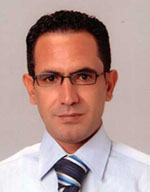April 8, 2010
Dear Minister el-Adly,
The Committee to Protect Journalists is writing to protest the continued detention of Mosad Soleiman, known online as Mosad Abu Fagr, a blogger, novelist, and activist who writes about social and political issues on his blog, Wedna N`ish (We Want to Live). Abu Fagr has been in administrative detention by order of the Ministry of Interior since February 2008, despite obtaining 18 court orders for his release, his lawyer, Ahmed Ragheb, told CPJ.
CPJ first raised Abu Fagr’s case in a letter to President Hosni Mubarak in March 2009. Scores of domestic, regional, and international rights groups have also called on your government to stop its persecution of this critical journalist.
Abu Fagr, at left, was arrested at home in Ismailiyya in December 2007 following demonstrations in Sinai to protest the razing of homes on Egypt’s border with the Gaza Strip, according to local and international human rights reports. Over time, in an effort that can only be characterized as politically motivated, Abu Fagr was charged with an assortment of offenses, including “organizing a congregation of people comprising more than five individuals, endangering public safety,” “possessing a weapon without a license,” “driving without a license [plate],” “in collaboration with others, possession and promotion of tracts and publications that include incitement to resisting public authorities,” “participation with others in intentionally setting fire to banknotes…with the intention of harming the national economy,” “assault against state employees [police],” and “resisting authorities.” Abu Fagr was held under an administrative detention order while the charges were investigated. In the 28 months since his arrest, Abu Fagr has never stood trial.
On February 11, 2008, Abu Fagr successfully challenged his administrative detention in an al-Arish court; the court ordered him released that same day, according to his lawyer. But the following day, state prosecutors appealed the order. Despite a higher court’s decision to uphold the lower’s court ruling, authorities did not release him.
Three days later, on February 15, your ministry issued an administrative detention order for Abu Fagr. On March 24, 2008, his lawyers lodged a complaint with the
Supreme State Security Court, which also ordered that he be released.The Ministry of Interior appealed the
Supreme State Security Court’s decision as well. On May 12, 2008, the same court confirmed the release order. The court is the highest judicial authority that employs the emergency law, which, in force since 1981, allows indefinite detention. However, Abu Fagr was issued yet another administrative detention order. Between February 2008 and September 2009, the Ministry of Interior blatantly abused its powers under the emergency law, immediately followed each of the Supreme State Security Court’s 18 release orders with 18 new administrative detention orders.Abu Fagr, who has been moved from one jail to another frequently, went on hunger strike at least once in 2008 to protest his mistreatment. As a result of unsanitary conditions in Borg al-Arab prison, where he was held for one year, Abu Fagr developed an abscess on his foot, his wife told CPJ. The prison authorities provided no medical treatment and a fellow inmate, a doctor, performed surgery with crude instruments and without anesthetic. His recovery was facilitated by medication provided by his family and lawyer.
More than two years after he was first ordered to be set free, Abu Fagr remains in prison. The treatment he has suffered is not only a stark violation of domestic law and Egypt’s international obligations, but also betrays the rationale given by the government for the continued use of the emergency law, which is supposedly meant to combat terrorism and other violent acts, not peaceful dissent. We urge you to cease issuing administrative detention orders against Abu Fagr and instead facilitate his immediate and unconditional release.
Thank you for your attention to this important matter. We look forward to your reply.
Sincerely,
Joel Simon
Executive Director
